Araratian Pontifical Diocese
Araratian Pontifical Diocese (Armenian: Արարատյան Հայրապետական թեմ Araratyan Hayrapetakan t'em) is the largest diocese of the Armenian Apostolic Church and one of the oldest dioceses in the world, covering the city of Yerevan and the Ararat Province within Armenia.[1]
Diocese of Araratian Արարատյան Հայրապետական թեմ | |
|---|---|
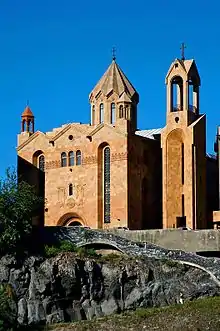 | |
| Location | |
| Country | Armenia |
| Statistics | |
| Population - Total | (as of 2011) 1,300,000 |
| Information | |
| Denomination | Armenian Apostolic Church |
| Rite | Armenian Rite |
| Established | 4th century |
| Cathedral | Saint Sarkis, Yerevan |
| Current leadership | |
| Patriarch | Karekin II |
| Pontifical vicar | Archbishop Navasard Kchoyan |
| Website | |
| Official website | |
History
The origin of Araratian Pontifical Diocese dates back the beginning of the 4th century. With the Christianzation of Armenia, Saint Gregory the Illuminator established the Catholicosate of All Armenians in Vagharshapat, as well as the Araratian Pontifical Diocese and appointed Bishop Albianus as the first primate vicar of the newly-founded diocese. The name of the diocese is derived from Mount Ararat; the symbol of the Armenian nation. At first, the diocese included the territories of Ararat plain, Nakhijevan, Kotayk and the western territories of Lake Sevan. It is believed that the diocese was commonly known as the Diocese of Yerevan between the 15th and 19th centuries. Under the Russian rule during the mid 19th century, the jurisdiction of the diocese was expanded to included the territories of Syunik and Shirak as well, followed by the area of Kars in 1878, covering almost the entire area of Eastern Armenia.

At the beginning of the 20th century, the Araratian Pontifical Diocese had 643 churches, 13 monastic complexes and more than 150 schools functioning under its jurisdiction. In August 1920, upon a kontakion issued by Catholicos George V, the territory of Shirak was separated from the Araratian Diocese to form the Diocese of Shirak. After the Treaty of Moscow in 1921, the Araratian Diocese lost the territories of Kars and Nakhijevan. The diocese lost most of its properties under the Soviet rule between 1920 and 1991.
With the independence of Armenia in 1991, the Armenian Church was reorganized, most of the properties were returned to the church and many new dioceses were established based on the administrative divisions of Armenia.
Currently, the Araratian Pontifical Diocese is the largest diocese of the Armenian Church, with around 1.3 million people under its jurisdiction. The primate vicar of the diocese is Archbishop Navasard Kchoyan, serving since 1999.[2] The diocesan headquarters are located in the capital Yerevan, next to the Saint Sarkis Cathedral.
Active churches
As of June 2017, the diocese has the below listed churches and chapels functioning under its jurisdiction, operating throughout Yerevan and Ararat Province, with the exception of the 17th-century Khor Virap monastic complex in Ararat Province, the Cathedral of Saint Gregory in Yerevan opened in 2001, and the Surp Anna Church in Yerevan opened in 2015, which are directly regulated by the Mother See of Holy Etchmiadzin.[3]
Here is the list of churches, monasteries and chapels functioning under the jurisdiction of the Araratian Pontifical Diocese, along with their location and year of consecration:
Churches
- In Yerevan
- Katoghike Church, 1264
- Saint Hakob Church of Kanaker, 1679
- Zoravor Surp Astvatsatsin Church, 1694
- Surp Gevork Church of Noragavit, 17th century
- Saint John the Baptist Church, 1710
- Saint Sarkis Cathedral, 1842
- Surp Kiraki Church, 19th century
- Holy Mother of God Church of Nork-Marash, 1995
- Holy Vartanants Martyrs Church of Yerablur, 1998
- Holy Mother of God Church of Malatia-Sebastia, 1998
- Saint Sarkis Church of Nor Nork, 1999
- Holy Mother of God Church of Avan, Yerevan, 2002
- Holy Martyrs Church of Davtashen, 2003
- Holy Trinity Church, 2005
- Surp Khach Church of Charbakh, 2006
- Holy Mother of God Church of Nor Nork, 2014
- Holy Martyrs Church of Nubarashen, 2015
 Katoghike Church, 1264
Katoghike Church, 1264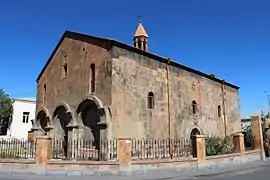 Saint Hakob Church of Kanaker, 1679
Saint Hakob Church of Kanaker, 1679 Zoravor Surp Astvatsatsin Church, 1694
Zoravor Surp Astvatsatsin Church, 1694.JPG.webp) Surp Gevork Church of Noragavit, 17th century
Surp Gevork Church of Noragavit, 17th century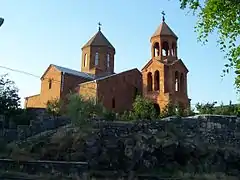 Saint John the Baptist Church, 1710
Saint John the Baptist Church, 1710 Saint Sarkis Cathedral, 1842
Saint Sarkis Cathedral, 1842 Surp Kiraki Church, 19th century
Surp Kiraki Church, 19th century Holy Mother of God Church of Nork-Marash, 1995
Holy Mother of God Church of Nork-Marash, 1995.jpg.webp) Holy Vartanants Martyrs Church of Yerablur, 1998
Holy Vartanants Martyrs Church of Yerablur, 1998 Holy Mother of God Church of Malatia-Sebastia, 1998
Holy Mother of God Church of Malatia-Sebastia, 1998 Saint Sarkis Church of Nor Nork, 1999
Saint Sarkis Church of Nor Nork, 1999.JPG.webp) Holy Mother of God Church of Avan, Yerevan, 2002
Holy Mother of God Church of Avan, Yerevan, 2002 Holy Martyrs Church of Davtashen, 2003
Holy Martyrs Church of Davtashen, 2003 Holy Trinity Church, 2005
Holy Trinity Church, 2005.jpg.webp) Surp Khach Church of Charbakh, 2006
Surp Khach Church of Charbakh, 2006 Holy Mother of God Church of Nor Nork, 2014
Holy Mother of God Church of Nor Nork, 2014 Holy Martyrs Church of Nubarashen, 2015
Holy Martyrs Church of Nubarashen, 2015
- In Ararat Province
- Surp Hakob Church, Ararat village, 1866
- Saint Gregory Church, Byuravan, mid 19th century, rebuilt in 1999
- Holy Mother of God Church, Dimitrov, 1868
- Holy Mother of God Church, Verin Artashat, 19th century
- Surp Hovhannes Church, Mkhchyan, 1890
- Holy Mother of God Church, Dalar, 1890
- Surp Sarkis Church, Argavand, 1897
- Surp Hakob Church, Mrgavan, 1905
- Saint George's Church, Kanachut, 1908
- Holy Mother of God Church, Vedi, 2000
- Surp Harutyun Church, Nerkin Dvin, 2000
- Saint George's Church, Marmarashen, 2002
- Holy Mother of God Church, Arevshat, 2006
- Holy Mother of God Church, Shahumyan, 2009
- Saint George's Church, Masis, 2009
- Holy Mother of God Church, Norabats, 2014
- Saint John the Evangelist's Church, Artashat 2015
- Saint Thaddeus Church, Masis, 2015
.jpg.webp) Surp Hakob Church, Ararat village, 1866
Surp Hakob Church, Ararat village, 1866 Holy Mother of God Church, Dimitrov, 1868
Holy Mother of God Church, Dimitrov, 1868_(1).JPG.webp) Holy Mother of God Church, Verin Artashat, 19th century
Holy Mother of God Church, Verin Artashat, 19th century.jpg.webp) Holy Mother of God Church, Dalar, 1890
Holy Mother of God Church, Dalar, 1890%252C_2016_(11).JPG.webp) Surp Sarkis Church, Argavand, 1897
Surp Sarkis Church, Argavand, 1897.jpg.webp) Surp Hakob Church, Mrgavan, 1905
Surp Hakob Church, Mrgavan, 1905.JPG.webp) *Saint George's Church, Kanachut, 1908
*Saint George's Church, Kanachut, 1908 Holy Mother of God Church, Vedi, 2000
Holy Mother of God Church, Vedi, 2000.jpg.webp) Surp Harutyun Church, Nerkin Dvin, 2000
Surp Harutyun Church, Nerkin Dvin, 2000 Holy Mother of God Church, Arevshat, 2006
Holy Mother of God Church, Arevshat, 2006.JPG.webp) Holy Mother of God Church, Shahumyan, 2009
Holy Mother of God Church, Shahumyan, 2009.jpg.webp) Saint George's Church, Masis, 2009
Saint George's Church, Masis, 2009.JPG.webp) Saint John the Evangelist's Church, Artashat, 2015
Saint John the Evangelist's Church, Artashat, 2015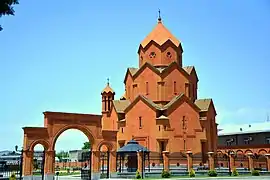 Saint Thaddeus Church, Masis, 2015
Saint Thaddeus Church, Masis, 2015
Chapels
- Saint Ananias' Chapel, Yerevan, 1889
- Surp Khach Zoravor Chapel, Yerevan, 1991
- Surp Karapet Chapel, Berkanush, rebuilt in 2006
.jpg.webp) Saint Ananias' Chapel, Yerevan, 1889
Saint Ananias' Chapel, Yerevan, 1889.jpg.webp) Surp Karapet Chapel, Berkanush, rebuilt in 2006
Surp Karapet Chapel, Berkanush, rebuilt in 2006
Inactive/ruined churches and monasteries
This is an incomplete list of inactive or ruined churches and monasteries in the territory regulated by the Araratian Pontifical Diocese:
- Holy Mother of God Chapel of Avan, Yerevan, 4th century
- Katoghike Tsiranavor Church of Avan, Yerevan, 591
- Surp Hovhannes Chapel of Avan, Yerevan, 12-13th centuries
- Aghjots Vank near Goght and Garni, 13th century
- Hovhannes Karapet Monastery near Lusashogh, 13th century
- Holy Mother of God Church of Kanaker, Yerevan, 1695
- Holy Mother of God Parochial Church of Avan, Yerevan, 19th century
 Holy Mother of God Chapel of Avan, Yerevan, 4th century
Holy Mother of God Chapel of Avan, Yerevan, 4th century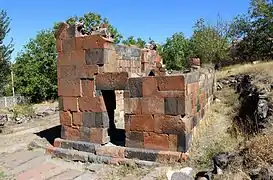 Surp Hovhannes Chapel of Avan, Yerevan, 5th century
Surp Hovhannes Chapel of Avan, Yerevan, 5th century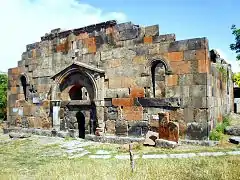 Katoghike Tsiranavor Church of Avan, Yerevan, 591
Katoghike Tsiranavor Church of Avan, Yerevan, 591 Aghjots Vank near Goght and Garni, 13th century
Aghjots Vank near Goght and Garni, 13th century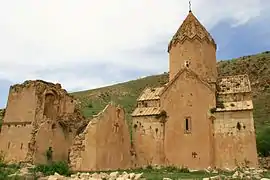 Hovhannes Karapet Monastery near Lusashogh, 13th century
Hovhannes Karapet Monastery near Lusashogh, 13th century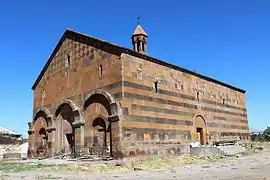 Holy Mother of God Church of Kanaker, Yerevan, 1695
Holy Mother of God Church of Kanaker, Yerevan, 1695 Holy Mother of God Parochial Church of Avan, Yerevan, 19th century
Holy Mother of God Parochial Church of Avan, Yerevan, 19th century
References
- "History". Archived from the original on 2014-10-16. Retrieved 2014-10-07.
- Archbishop Navasard Kchoyan
- Churches of the Araratian Pontifical Diocese